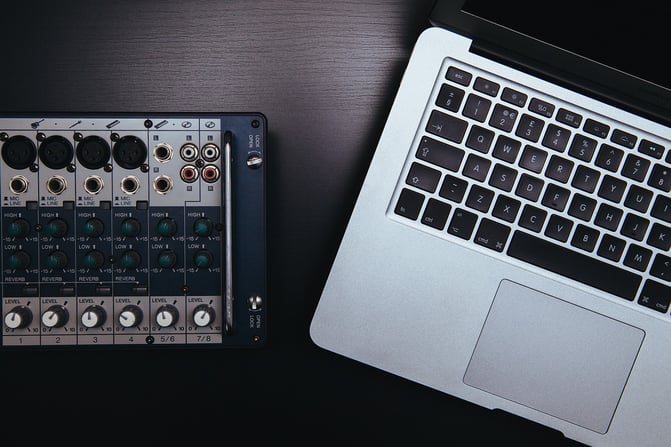
Have you always wanted to produce your music but never got around to it? Is your kid thinking about producing music of their own? These days, producing music is a long and expensive process – if you hire professionals to help you out.
We want to help you start down the path of producing your own music right here! We’ll cover the steps that go into the process of recording, editing, mixing and promoting your stuff for the world to hear!
1. The BasicsThere are a few fundamental elements to nail down before jumping into the actual process of creating your own tunes. These include:
- Equipment – You have to have the right kind of instruments and technology to be able to actually record anything. Take a look at the equipment that will help you get off to a great start.
- Software – Unless you’re planning on only playing at live events, at some point you will need software to move toward production. For some suggestions, check out this list of the top music production software.
- Composition – Before you take even one step toward the recording process, you have to know what you want to record! If you’ve got a song in mind, think of the basics: chord progression, theme, genre, lyrics, etc. Get those settled down so that when you start recording you will have a direction of what you want it to sound like.
2. Recording Process
If you are recording by yourself, there is really only one technique that will work best for you: multitrack recording. This means recording each aspect of the song – every instrument, vocals, etc. – separately. That way you can mix and match in the editing process with as little gray hairs as possible.
Step 1 – Pick a “Guide”
 Pick something to lead the procession of the other instruments. Most people use a click metronome. Other options include a prerecorded drum loop or a scratch track.
Pick something to lead the procession of the other instruments. Most people use a click metronome. Other options include a prerecorded drum loop or a scratch track.
Step 2 – Record the Rhythm Section
The rhythm section is the base of the song that you will build every other element off of. For most songs, this section will include drums, bass, and possibly an acoustic guitar.
Step 3 – Record the Melodies
The melody of a song will carry the dominant tune that will get stuck in everyone’s head. This is where that chord structure comes in. Get the main theme of the song recorded, then go back and change or add to it if you don’t love it.
Step 4 – Record the Harmonies
Harmony is what will support your melody. When you record harmonies, include a guitar, some piano, synths, horns – or any other instruments that will bring out a little more life from the melody.
Step 5 – Add some Spice
Finally, add the finishing touches to your piece with some flare. This can include background vocals, percussion fills, piano fills, and sound effects. Be careful, though. You don’t want to add something that will become a nuisance rather than a golden nugget.
3. Editing Process
Now you are ready to enter the process of editing, which is essentially fixing the mistakes and making it look pretty – metaphorically speaking. Let’s take a look at the aspects of editing music:
- Arrangement – Listen to what you have – the whole thing as is. It’s not going to sound perfect, but that’s why you edit! In arrangements, all you want to do is move around, cut, or completely remove parts of the song.
- Comping – With comping, you’ll want to compare duplicates of each take and decided which one is best for the final cut. Or, if you like the beginning of one and the end of another, you can always pull a “Frankenstein” and mix the two.
- Noise Reduction – This one is pretty self-explanatory. With noise reduction, you want to cut out all of the “extra stuff” in the song. This can include:
- Background noise
- Amp hissing
- Footsteps
- Squeaks
- Breaths
- Dead air
- Time Editing – When time-editing, all you want to do is adjust off beat notes. You can do this by using cut and paste for percussion, or try the time-stretching method.
- Fix off-beat notes
- Cut and paste – percussion
- Time stretching method – all instruments
- Fix off-beat notes
- Pitch Editing – Editing pitch is essentially auto-tune – for both vocals and instruments!
4. Mixing Process
 When it’s time for mixing, the goal is to come out the other side with a unified and cohesive piece of music. Steps that are involved in mixing include:
When it’s time for mixing, the goal is to come out the other side with a unified and cohesive piece of music. Steps that are involved in mixing include:
- Automation – This helps you be able to change the settings at any point of the song.
- Balancing Faders – Balancing faders will help the instruments stay at a consistent volume with the others – not becoming too soft or loud.
- Compression – Compression helps each note be heard clearly, and the mix to sound better as a whole.
- Equalization – This ensures that no two sounds are competing for the same frequencies.
- Panning – Panning allows each instrument to gain its own stereo-image.
5. Promote Music
Now that your music is recorded, edited, and mixed, it’s time to share your masterpiece with the world! For promotion tips, check out this article. Remember to keep practicing, recording, and improving!
6. In Conclusion
We hope this article has helped you gain a better understanding of what goes into the recording process. If you’ve always wanted to produce your music, or have a kid who is interested in a music career, we encourage you to start the process and share your results!

